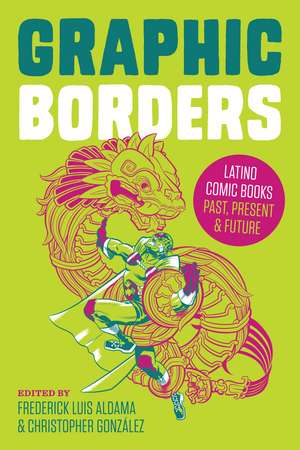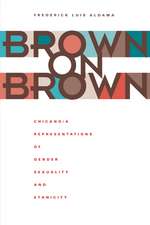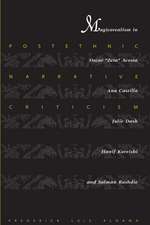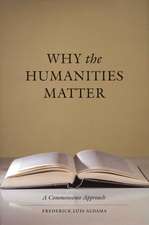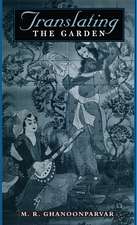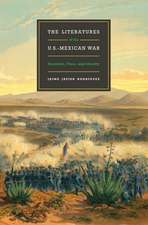Graphic Borders: Latino Comic Books Past, Present, and Future: World Comics and Graphic Nonfiction Series
Editat de Frederick Luis Aldama, Christopher Gonzálezen Limba Engleză Paperback – 12 apr 2016
Graphic Borders presents the most thorough exploration of comics by and about Latinos currently available. Thirteen essays and one interview by eminent and rising scholars of comics bring to life this exciting graphic genre that conveys the distinctive and wide-ranging experiences of Latinos in the United States. The contributors’ exhilarating excavations delve into the following areas: comics created by Latinos that push the boundaries of generic conventions; Latino comic book author-artists who complicate issues of race and gender through their careful reconfigurations of the body; comic strips; Latino superheroes in mainstream comics; and the complex ways that Latino superheroes are created and consumed within larger popular cultural trends. Taken as a whole, the book unveils the resplendent riches of comics by and about Latinos and proves that there are no limits to the ways in which Latinos can be represented and imagined in the world of comics.
Preț: 242.17 lei
Nou
Puncte Express: 363
Preț estimativ în valută:
46.34€ • 48.73$ • 38.29£
46.34€ • 48.73$ • 38.29£
Carte tipărită la comandă
Livrare economică 17 aprilie-01 mai
Preluare comenzi: 021 569.72.76
Specificații
ISBN-13: 9781477309155
ISBN-10: 1477309152
Pagini: 316
Ilustrații: 51 b&w illus.
Dimensiuni: 152 x 229 x 33 mm
Greutate: 0.5 kg
Editura: University of Texas Press
Colecția University of Texas Press
Seria World Comics and Graphic Nonfiction Series
ISBN-10: 1477309152
Pagini: 316
Ilustrații: 51 b&w illus.
Dimensiuni: 152 x 229 x 33 mm
Greutate: 0.5 kg
Editura: University of Texas Press
Colecția University of Texas Press
Seria World Comics and Graphic Nonfiction Series
Notă biografică
Frederick Luis Aldama is Arts and Humanities Distinguished Professor of English and University Distinguished Scholar at the Ohio State University.
Christopher González is an assistant professor of English at Texas A&M University-Commerce.
Christopher González is an assistant professor of English at Texas A&M University-Commerce.
Cuprins
- Taking Back Control of Our Story Space: A Foreword (Frank Espinosa)
- Latino Comic Books Past, Present, and Future—A Primer (Frederick Luis Aldama and Christopher González)
- Part I. Alternativas
- One. Out of Sequence: Time and Meaning in Los Bros Hernandez (Patrick L. Hamilton)
- Two. Recreative Graphic Novel Acts in Gilbert Hernandez’s Twenty-First-Century Neo-Noirs (Frederick Luis Aldama)
- Three. Three Decades with Gilbert and Jaime Hernandez: An Odyssey by Interview (Christopher González)
- Part II. Cuerpo Comics
- Four. Biographic Challenges: Wilfred Santiago’s 21: The Story of Roberto Clemente (Christopher González)
- Five. Wrestling with Comic Genres and Genders: Luchadores as Signifiers in Sonambulo and Locas (Ellen M. Gil-Gómez)
- Part III. Tortilla Strips
- Six. Latino Identity and the Market: Making Sense of Cantú and Castellanos’s Baldo (Héctor Fernández L’Hoeste)
- Seven. The Archeology of the Post-social in the Comics of Lalo Alcaraz: La Cucaracha and Migra Mouse: Political Cartoons on Immigration (Juan Poblete)
- Eight. My Debt to Rius (Ilan Stavans)
- Part IV. A Bird, a Plane ... Straight and Queer Super-Lats
- Nine. The Alien Is Here to Stay: Otherness, Anti-Assimilation, and Empowerment in Latino/a Superhero Comics (Mauricio Espinoza)
- Ten. Anya Sofía (Araña) Corazón: The Inner Webbings and Mexi-Ricanization of Spider-Girl (Isabel Millán)
- Eleven. Revealing Secret Identities: Gay Latino Superheroes and the Necessity of Disclosure (Richard T. Rodríguez)
- Part V. Multiverses, Admixtures, and More
- Twelve. Everybody Wants to Rule the Multiverse: Latino Spider-Men in Marvel’s Media Empire (Kathryn M. Frank)
- Thirteen. Mapping the Blatino Badlands and Borderlands of American Pop Culture (Adilifu Nama and Maya Haddad)
- Fourteen. The Paradox of Miles Morales: Social Gatekeeping and the Browning of America’s Spider-Man (Brian Montes)
- Works Cited
- Contributors
- Index
Recenzii
Graphic Borders is a meaty and expansive read, with a core through-line of unpacking the idea that Latina/o comics are redrawing the known borders of comics narrative. . . . The writing in this collection is strong and compelling, the themes wide ranging and cohesive, and the message highly relevant. If you want to get a great sense of what Latino/a comics are doing in the culture right now, this is a necessary starting point to your journey.
For those wanting a deeper look at the wells of artistic styles, cultural trends, and historical pressures that influenced our current crop of Latino artist-authors, this anthology digs wide and deep.
While the collection itself speaks more to notions of Latino culture and comic books in popular culture, the volume is wisely constructed to convey critical looks toward various dynamics of culture as a whole. . . In today’s contentious understandings of national, state, and urban borders, the use of comic books lays out an intriguing history of these political dynamics. . . Graphic Borders is a thorough look at Latino culture and comic books that engages subjects like borders, gender, history, politics, and sexuality in a cohesive collection of essays.
The essays in Graphic Borders do not fail to amaze, and the marshalling of such a wide variety of topics and comics by Aldama and González is nothing short of breathtaking. Whether for the comics novice or aficionado, this collection will introduce the reader to new modes of graphic narrative analysis and will shine as a lodestar for future scholarship in the years to come.
The anthology undoubtedly advances the scholarship on Latin@ comics in resourceful ways, as it brings to the fore the Latin@ intellectual multiverse.
Graphic Bordersquestions and redefines the 'American way,' building in new fissures, i.e. new territories that one can walk into to experience the Latino imagery, especially Latino comic imagery, in a new way.
Descriere
The first volume in a trailblazing series on world comics and graphic nonfiction, this book presents a comprehensive array of historical, formal, and cognitive approaches to Latino comics—an exciting popular culture space that captures the distinctive and
